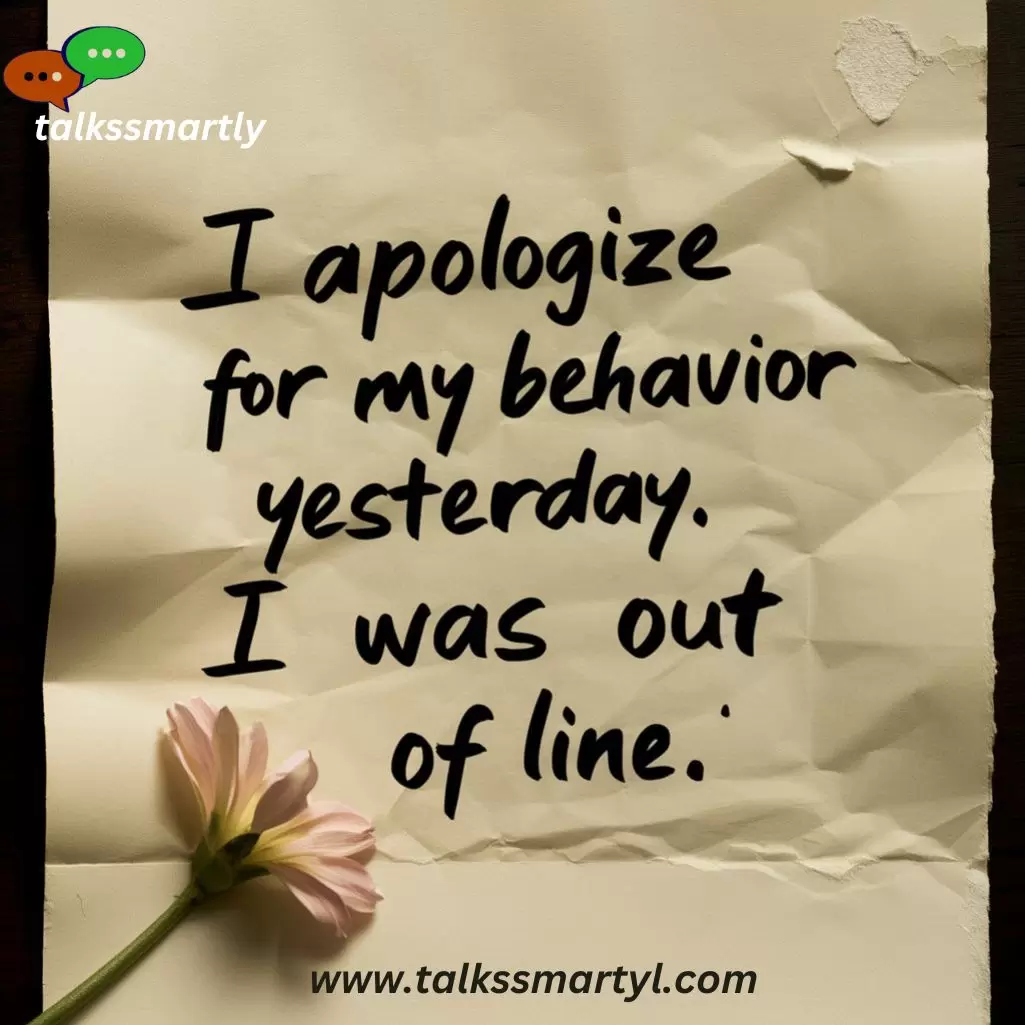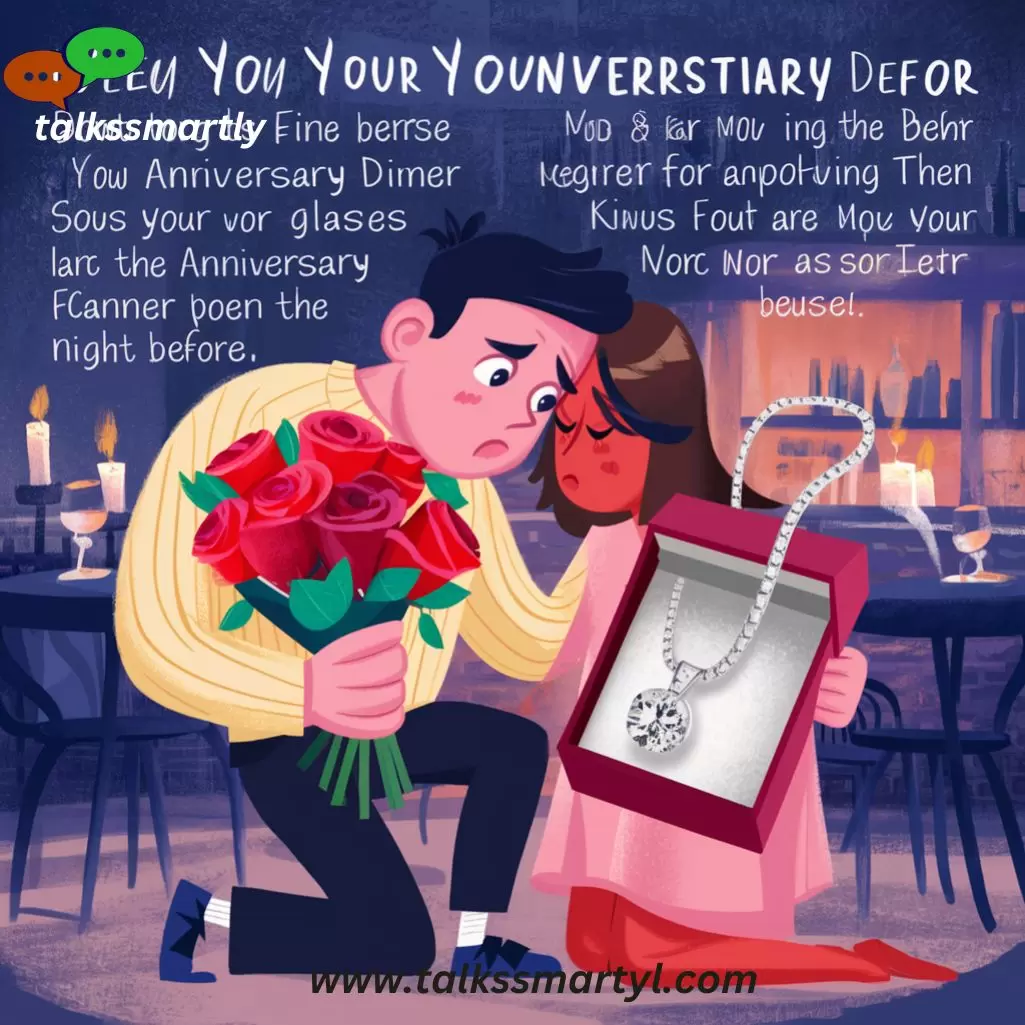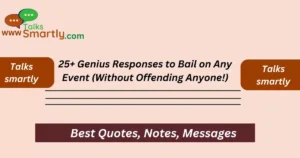Introduction
“I’m sorry for my mistake. I’ll do my best to make it right.””I apologize for my insensitivity. I should have considered your feelings, and I deeply regret it.”
When it comes to expressing regret or apologizing, the right words can make all the difference. In today’s digital age, text messaging has become one of the primary means of communication.
Whether you’ve made a mistake, unintentionally hurt someone’s feelings, or simply want to mend a broken relationship, saying sorry via text message can be a quick and effective way to convey your sincerity. However, it’s essential to choose your words carefully to ensure your apology comes across as genuine and heartfelt.
Overview
The article discusses the importance of apologizing and offers a comprehensive list of 95+ best ways to say sorry in a text message. It emphasizes the key components of a genuine apology, common mistakes to avoid, and tips for crafting a sincere apology text. The aim is to help individuals express regret effectively and mend relationships through thoughtful and empathetic communication.
Why Saying Sorry Matters?
Apologizing isn’t just about admitting fault; it’s about acknowledging the impact of your actions on someone else. Offering a sincere apology demonstrates empathy, humility, and a willingness to make amends.
In many cases, a well-crafted apology can repair damaged relationships and restore trust. On the other hand, a poorly worded apology or a failure to apologize altogether can deepen wounds and exacerbate conflict.
The Art of Apologizing: Key Components
A genuine apology consists of several key components:
1. Acknowledgment of wrongdoing:
Example: “I realize I made a mistake by missing our appointment.”
2. Acceptance of responsibility:
Example: “I take full responsibility for the misunderstanding.”
3. Expression of regret:
Example: “I am truly sorry for any inconvenience I may have caused.”
4. Empathy:
Example: “I understand how my actions may have hurt you, and I sincerely apologize.”
5. Commitment to change:
Example: “I will make sure to prioritize our appointments in the future.
95+ Best Ways to Say Sorry in a Text
- “I apologize for my behavior yesterday. I was out of line.”

- “I’m sorry for not responding to your messages sooner. I’ve been swamped with work.”
- “I regret what I said earlier. It was thoughtless of me.”
- “Please forgive me for being late. Traffic was terrible.”
- “I owe you an apology for forgetting your birthday. I feel awful about it.”
- “I’m sorry for any misunderstanding. Let’s talk and clear things up.”
- “I apologize for my mistake. I’ll do my best to make it right.”
- “I’m sorry if my actions hurt you. That was never my intention.”
- “Forgive me for not being there when you needed me. I’ll make it up to you.”
- “I’m truly sorry for letting you down. It won’t happen again.
- “”I apologize for my insensitivity. I didn’t consider your feelings, and I deeply regret it.”
- “I’m sorry for not being there when you needed me. I should have prioritized your needs.”
- “Please forgive me for the misunderstanding. I’ll make sure to communicate more clearly in the future.”
- “I regret my actions and the pain they caused. Can we talk things through?”
- “I’m sorry for being dismissive of your concerns. Your feelings are valid, and I should have listened.”
- “Forgive me for my impatience. I realize now that I should have been more understanding.”
- “I apologize for the inconvenience I caused. Let me know how I can make it up to you.”
- “Sorry for the delay in responding. I didn’t mean to leave you hanging.”
- “I’m truly sorry for my lack of communication. It wasn’t fair to leave you in the dark.”
- “Forgive me for my thoughtlessness. I should have considered the consequences of my actions.”
- “I’m sorry for the frustration my mistake caused. I’ll do my best to prevent it from happening again.”
- “Please accept my apology for any harm I’ve caused. It was never my intention.”
- “I apologize for speaking out of turn. I should have waited for the right moment.”
- “Sorry for my abruptness earlier. I realize now that it was uncalled for.”
- “Forgive me for my forgetfulness. I’ll set reminders to ensure it doesn’t happen again.”
- “I’m sorry for my lack of empathy. I didn’t fully understand how my actions would affect you.”
- “Please accept my sincerest apologies for my behavior. I’ll strive to do better in the future.”
- “I regret my actions and the pain they caused you. Can we work towards reconciliation?”
- “Sorry for my inconsiderate remarks. I’ll think twice before speaking next time.”
- “I apologize for my absence. I should have been there to support you.”
- “Forgive me for my stubbornness. I now see things from your perspective.”
- “I’m truly sorry for any inconvenience my actions may have caused. How can I make it right?”
- “Sorry for not taking your feelings into account. I’ll be more mindful in the future.”
- “Please forgive me for my thoughtlessness. I didn’t realize the impact of my words.”
- “I apologize for the tension between us. Can we find a way to move past it?”
- “Sorry for my lack of consideration. I’ll make sure to think before I act.”
- “I’m sorry for letting you down. I’ll do everything in my power to regain your trust.”
- “Forgive me for my arrogance. I’ll work on being more humble in the future.”
- “I apologize for my negligence. I’ll take steps to prevent it from happening again.”
- “Sorry for not being more supportive. I’ll be there for you from now on.”
- “Please accept my apology for the misunderstanding. Let’s try to find common ground.”
- “I regret my actions and the pain they caused. How can I make it right?”
- “Sorry for not considering your perspective. I’ll make an effort to understand where you’re coming from.”
- “I apologize for my thoughtlessness. Can we start over?”
- “Forgive me for my lack of understanding. I’ll educate myself to avoid similar mistakes.”
- “I’m sorry for being insensitive to your needs. I’ll prioritize them from now on.”
- “Sorry for my lack of communication. I’ll make an effort to keep you informed.”
- “Please accept my apology for the oversight. I’ll take steps to prevent it from happening again.”
- “I apologize for my impulsive actions. I’ll think before I act in the future.”
- “Forgive me for my indecisiveness. I’ll work on making clearer decisions.”
- “I’m truly sorry for the pain I’ve caused. Can we work towards forgiveness?”
- “Sorry for not being there when you needed me most. I’ll make it up to you.”
- “Please accept my sincerest apologies for my behavior. I’ll strive to do better.”
- “I apologize for the inconvenience. Let me know how I can make things right.”
- “Sorry for the misunderstanding. Can we talk things through?”
- “I’m sorry for not being more considerate. I’ll make sure to think of others in the future.”
- “Forgive me for my insensitivity. I’ll make an effort to be more empathetic.”
- “I apologize for my negligence. I’ll take steps to rectify the situation.”
- “Sorry for my lack of attention. I’ll make sure to give you the focus you deserve.”
- “Please accept my apology for my lack of understanding. I’ll educate myself to avoid similar mistakes in the future.”
- “I’m sorry for my impulsive actions. I’ll think before I act in the future.”
- “Forgive me for my indecisiveness. I’ll work on making clearer decisions.”
- “I’m truly sorry for the pain I’ve caused. Can we work towards forgiveness?”
- “Sorry for not being there when you needed me most. I’ll make it up to you.”
- “Please accept my sincerest apologies for my behavior. I’ll strive to do better.”
- “I apologize for the inconvenience. Let me know how I can make things right.”
- “Sorry for the misunderstanding. Can we talk things through?”
- “I’m sorry for not being more considerate. I’ll make sure to think of others in the future.”
- “Forgive me for my insensitivity. I’ll make an effort to be more empathetic.”
- “I apologize for my negligence. I’ll take steps to rectify the situation.”
- “Sorry for my lack of attention. I’ll make sure to give you the focus you deserve.”
- “Please accept my apology for my lack of understanding. I’ll educate myself to avoid similar mistakes in the future.”
- “I apologize for my insensitivity. I didn’t consider your feelings, and I deeply regret it.”
- “Sorry for not being there when you needed me. I should have prioritized your needs.”
- “Please forgive me for the misunderstanding. I’ll make sure to communicate more clearly in the future.”
- “I regret my actions and the pain they caused. Can we talk things through?”
- “I’m sorry for being dismissive of your concerns. Your feelings are valid, and I should have listened.”
- “Forgive me for my impatience. I realize now that I should have been more understanding.”
- “I apologize for the inconvenience I caused. Let me know how I can make it up to you.”
- “Sorry for the delay in responding. I didn’t mean to leave you hanging.”
- “I’m truly sorry for my lack of communication. It wasn’t fair to leave you in the dark.”
- “Forgive me for my thoughtlessness. I should have considered the consequences of my actions.”
- “I apologize for the frustration my mistake caused. I’ll do my best to prevent it from happening again.”
- “Please accept my apology for any harm I’ve caused. It was never my intention.”
- “I apologize for speaking out of turn. I should have waited for the right moment.”
- “Sorry for my abruptness earlier. I realize now that it was uncalled for.”
- “Forgive me for my forgetfulness. I’ll set reminders to ensure it doesn’t happen again.”
- “I’m sorry for my lack of empathy. I didn’t fully understand how my actions would affect you.”
- “Please accept my sincerest apologies for my behavior. I’ll strive to do better in the future.”
- “I apologize for my absence. I should have been there to support you.”
- “Forgive me for my stubbornness. I now see things from your perspective.”
- “I’m truly sorry for any inconvenience my actions may have caused. How can I make it right?”
- “Sorry for not taking your feelings into account. I’ll be more mindful in the future.”
- “Please forgive me for my thoughtlessness. I didn’t realize the impact of my words.”
- “I apologize for the tension between us. Can we find a way to move past it?”
- “Sorry for my lack of consideration. I’ll make sure to think before I act.”
- “I’m sorry for letting you down. I’ll do everything in my power to regain your trust.”
Appreciation Message After My Dad Burial
Common Mistakes to Avoid
While apologizing via text can be convenient, there are some common pitfalls to watch out for:
1. Lack of sincerity:
Example: “Sorry, my bad.”
2. Blaming others:
Example: “I’m sorry you feel that way.”

3. Making excuses:
Example: “I had a lot on my plate, so I couldn’t help it.”
4. Downplaying the impact:
Example: “It’s not a big deal.”
5. Using vague language:
Example: “I guess I messed up.”
How to Craft a Genuine Apology Text
When composing an apology text, keep the following tips in mind:
1. Be specific:
Example: “I apologize for forgetting our anniversary dinner last night.”

2. Use “I” statements:
Example: “I take full responsibility for what happened.”
3. Express empathy:
Example: “I understand how my actions hurt you, and I’m truly sorry.”
4. Offer to make amends:
Example: “Is there anything I can do to make it right?”
5. Avoid robotic language:
Example: Instead of “I apologize for the inconvenience,” try “I’m truly sorry for any trouble I caused.”
Conclusion
Apologizing via text message can be an effective way to mend relationships and resolve conflicts. By choosing your words carefully and expressing genuine remorse, you can convey your sincerity and rebuild trust with the person you’ve wronged. Remember to be specific, take responsibility for your actions, and offer to make amends.
By following these guidelines, you can navigate even the most challenging apology situations with grace and integrity. So, the next time you find yourself in need of saying sorry via text, refer back to these 60 best ways .











